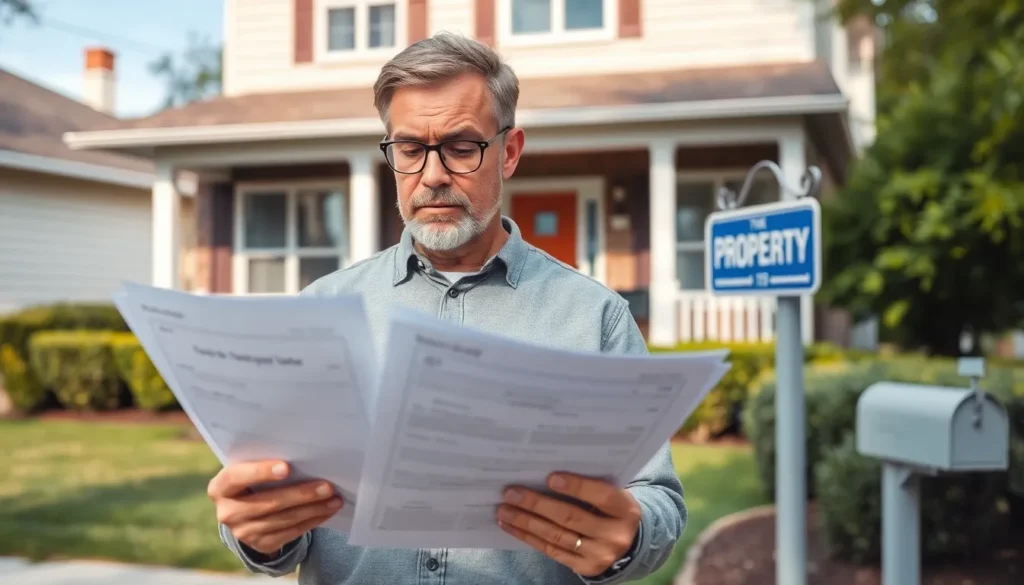Table of Contents
ToggleReaching the age of 65 is a milestone worth celebrating, but it can also come with its fair share of financial worries. One of the biggest concerns for seniors is the ever-looming threat of rising property taxes. Imagine enjoying your golden years while your tax bill keeps climbing like a cat up a tree. Wouldn’t it be nice to hit the pause button on that?
Freezing property taxes at 65 isn’t just a dream; it’s a reality in many places. This little-known perk can help seniors keep their hard-earned homes without the stress of escalating costs. So grab a cup of coffee, sit back, and let’s explore how freezing those pesky property taxes can turn retirement into a stress-free adventure. After all, who wouldn’t want to enjoy their twilight years without tax-related headaches?
Understanding Freezing Property Taxes at 65
Freezing property taxes at age 65 represents a beneficial measure for many seniors. This option helps maintain financial stability by preventing tax bills from rising, allowing retirees to enjoy their golden years.
What Does Freezing Property Taxes Mean?
Freezing property taxes means locking the assessed value of a property at a certain amount. For homeowners aged 65 and older, this ensures tax bills do not increase even as property values rise. Seniors can budget more effectively, as fixed costs remain stable. Many local governments offer this program to assist older residents. Not only does freezing provide peace of mind regarding property taxes, it also fosters a more affordable living situation.
Eligibility Criteria for Freezing Property Taxes
Eligibility varies by state and locality but typically requires homeowners to be at least 65 years old. Additionally, residents may need to demonstrate ownership of the property for a specific duration. Income levels can also play a role; some programs target low to moderate-income seniors. Proof of age, residency, and income must often be submitted to apply. Those meeting these criteria may access the freeze, thereby gaining significant financial relief.
Benefits of Freezing Property Taxes

Freezing property taxes at age 65 offers significant advantages for seniors. This option creates financial relief and stability in housing costs, ensuring retirees can enjoy their golden years without the constant strain of rising tax bills.
Financial Relief for Seniors
Financial relief comes from locking in current property tax rates. By freezing taxes, seniors avoid increases that often accompany rising property values. This stability allows for easier budgeting and planning. Many seniors live on fixed incomes, making predictable expenses essential. The program significantly reduces uncertainty, giving peace of mind during retirement years. In areas with high property values, this relief becomes crucial for maintaining quality of life. Reduced financial strain helps seniors allocate resources toward healthcare, leisure activities, and daily necessities.
Stability in Housing Costs
Stability in housing costs enhances overall financial security. Freezing property taxes means expenses remain manageable, regardless of market fluctuations. Seniors depend on this stability, as unexpected costs can derail budgets. Knowing what to expect each year allows seniors to focus on other aspects of retirement. Additionally, this predictability contributes to maintaining long-term home ownership. Many seniors choose to age in place, and stabilized housing costs support this decision. Secure living environments foster comfort and community, which are vital for well-being in later years.
How to Apply for Freezing Property Taxes
Applying for freezing property taxes involves understanding specific procedures and requirements. Seniors reaching age 65 can pursue this option to protect themselves from rising tax bills.
Application Process Overview
The application process varies by state and local jurisdiction. Seniors typically start by contacting their local tax authority to find the relevant forms and instructions. Completing the application involves providing necessary information regarding property ownership and age. After submitting the application, residents may need to wait for confirmation of approval. Deadlines for submission often exist, so checking local regulations is vital.
Required Documentation
Several documents are necessary to complete the application. Applicants must provide proof of age, such as a birth certificate or government-issued ID. Property ownership verification, like a deed, is also essential. Additionally, some jurisdictions require income statements, tax returns, or other financial documents to ensure eligibility. Seniors should gather all relevant materials before beginning the application process to streamline submission and avoid delays.
State Variations in Property Tax Freezing Policies
State policies for freezing property taxes at age 65 vary significantly. Each state has its unique criteria and provisions, affecting the financial landscape for seniors.
States with Notable Programs
California offers significant benefits through its Proposition 60 and 90 programs. Residents aged 55 and older can transfer their property’s assessed value to a new home, keeping property taxes stable. Florida’s homestead exemption allows seniors to freeze their property taxes, provided their household income falls below a certain threshold. New York also features a Senior Citizens Exemption, enabling homeowners aged 65 and older to decrease their taxable property value, benefiting those with limited income. Iowa and Oregon provide programs specifically targeting seniors, offering various income caps and assessed value freezes.
Comparison of Benefits Across States
Benefits across states reflect diverse approaches to property tax relief for seniors. In Texas, for instance, homeowners aged 65 and older receive a substantial increase in their homestead exemption amount. Seniors in Massachusetts can enjoy a property tax deferment option, allowing them to postpone payment until the home is sold or the owner passes away. In contrast, Washington State offers a property tax exemption for low-income seniors, which completely eliminates taxes for eligible applicants. Understanding these variations helps seniors assess their options and choose the best programs that align with their financial needs and goals.
Freezing property taxes at 65 offers seniors a valuable opportunity to secure their financial future. By locking in their property’s assessed value, they can avoid the stress of rising tax bills and maintain control over their budgets. This measure not only enhances financial stability but also supports the desire for aging in place.
Understanding the eligibility criteria and application process is crucial for seniors looking to benefit from this program. With various state-specific options available, seniors can find the right fit for their needs. Ultimately, taking advantage of property tax freezes can significantly improve the quality of life for retirees, allowing them to focus on what truly matters during their golden years.







